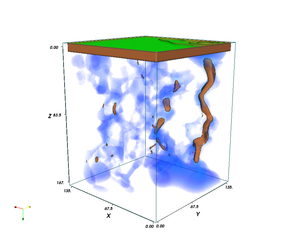Difference between revisions of "Transport in Porous Media"
| (15 intermediate revisions by 3 users not shown) | |||
| Line 1: | Line 1: | ||
__NOTOC__ | __NOTOC__ | ||
| + | [[Image:Porousflow.png|300px|right|thumb| LB simulation of flow (top to bottom) in a discretized porous media model (sandstone). In blue the volume with V>0. Brow isosurfaces visualize regions with a high velocity.]] | ||
| + | |||
== Introduction == | == Introduction == | ||
| − | Understanding fluid transport in natural porous media is important for many | + | <onlyinclude>Understanding fluid transport in natural porous media is important for many |
industrial and scientific applications. Computer simulations require accurate | industrial and scientific applications. Computer simulations require accurate | ||
three-dimensional microscopic structure data as input and efficient numerical | three-dimensional microscopic structure data as input and efficient numerical | ||
| Line 7: | Line 9: | ||
and clay filled sandstones exhibit heterogeneities on many scales and cannot be | and clay filled sandstones exhibit heterogeneities on many scales and cannot be | ||
modeled by existing modeling techniques. | modeled by existing modeling techniques. | ||
| + | </onlyinclude> | ||
== Our Project == | == Our Project == | ||
| − | A continuum model is developed for | + | A continuum model is developed for generating synthetic microcomputer-tomography data of multiscale porous media at arbitrary resolution. Large scale parallelized lattice-Boltzmann simulations are performed to calculate transport parameters, such as permeabilities using Darcy's Law, and other material parameters. |
| − | generating synthetic microcomputer-tomography data of multiscale porous media | ||
| − | at arbitrary resolution. Large scale parallelized lattice-Boltzmann simulations | ||
| − | are performed to calculate transport and material parameters. | ||
| − | == Lattice Boltzmann == | + | == Lattice Boltzmann Method == |
| − | The Lattice Boltzmann method numerically solves the discretized Boltzmann equation | + | The Lattice Boltzmann (LB) method numerically solves the discretized Boltzmann equation |
| − | using a | + | using a linearized collision operator to simulate the flow of a Newtonian fluid. We use the D3Q19 lattice model together with a single relaxation time (BGK) or two relaxation time (MRT/TRT) collision operator. Extensive calibrations for our LB-implementations were performed by simulating Poiseuille Flow in pipes of varying shapes and sizes. |
== Current Coworkers == | == Current Coworkers == | ||
* Prof. Dr. [[Rudolf Hilfer]], Project supervisor | * Prof. Dr. [[Rudolf Hilfer]], Project supervisor | ||
* [[Thomas Zauner]], PhD Student | * [[Thomas Zauner]], PhD Student | ||
| + | [[Category:Research]] | ||
Latest revision as of 16:38, 20 September 2011
Introduction
Understanding fluid transport in natural porous media is important for many industrial and scientific applications. Computer simulations require accurate three-dimensional microscopic structure data as input and efficient numerical algorithms for fluid flow simulations. Natural porous media such as carbonates and clay filled sandstones exhibit heterogeneities on many scales and cannot be modeled by existing modeling techniques.
Our Project
A continuum model is developed for generating synthetic microcomputer-tomography data of multiscale porous media at arbitrary resolution. Large scale parallelized lattice-Boltzmann simulations are performed to calculate transport parameters, such as permeabilities using Darcy's Law, and other material parameters.
Lattice Boltzmann Method
The Lattice Boltzmann (LB) method numerically solves the discretized Boltzmann equation using a linearized collision operator to simulate the flow of a Newtonian fluid. We use the D3Q19 lattice model together with a single relaxation time (BGK) or two relaxation time (MRT/TRT) collision operator. Extensive calibrations for our LB-implementations were performed by simulating Poiseuille Flow in pipes of varying shapes and sizes.
Current Coworkers
- Prof. Dr. Rudolf Hilfer, Project supervisor
- Thomas Zauner, PhD Student
